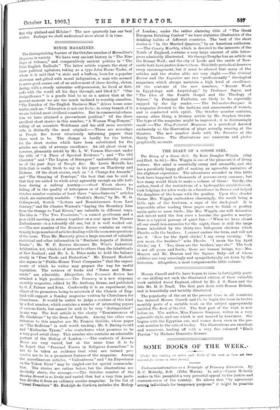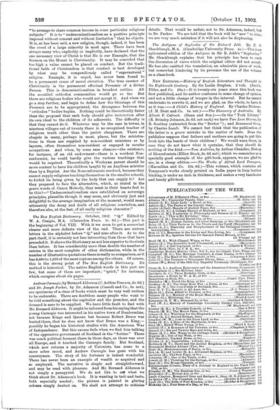SOME BOOKS OF THE WEEK..
[tinder this heading we notice such Vooks of the week as haps not bus reserved for review in other forms.; Undenotninationalisni as a Principle of Primary Education. By R. C. Moberly, D.D. (John Murray. le. net.)—Canon Moberly makes in this pamphlet a very powerful appeal to the justice and common-sense of the country. He allows that "by agreement among individuals for temporary purposes" it might be possible "to arrange to share common lessons in some particular religious subjects." It is to " undenominationalism as a positive principle Imposed without consent and without limitation" that he objects. It is, as has been said, a new religion, though, indeed, it has been the creed of a large minority in most ages. There have been always many who, explicitly or implicitly, have declared that the one necessary view of Christ is that He is our Example, that the Sermon on the Mount is Christianity. It may be conceded that too high a value cannot be placed on conduct. But the tradi- tional faith of Christendom is that conduct is best developed by what may be compendiously called " supernatural " religion. Example, it is urged, has never been found to be a permanent cause of moral elevation. The true essence of Christianity is the permanent effectual Presence of a divine Person. This is denominationalism in broadest outline. All the so-called orthodox communities would go so far. But there are religious bodies who would not accept it. And when we go a step further, and begin to define how the blessings of this Presence are to be appropriated, the divergence between the " orthodox" bodies begins. Nothing could be theoretically fairer than the proposal that each body should give instruction after its own ideal to the children of its adherents. The difficulty is that they cannot do it. Whatever may be the ease in towns, in nineteen villages out of twenty there is no recognised teacher of religious truth other than the parish clergyman. There are chapels in many, perhaps in most, places, but the ministra- tions in them are supplied by non-resident ministers or by laymen, often themselves non-resident or engaged in secular occupations. And when, by some rare chances—the existence, for instance, of an old endowment--there is a resident Non- conformist, he could hardly give the various teachings that would be required. Theoretically a Wesleyan parent should be more content to have his children taught by an Anglican minister than by a Baptist. Are the Nonconformists resolved, because they cannot supply religious teaching themselves in the smaller schools, to forbid its being given by the body that can supply it? Are they prepared to face the alternative, which, as stated in the grave words of Canon Moberly, they must in their hearts feel to be this?—" Undenominationalism once established on sovereign principles, plausible though it may seem, and obviously just and delightful to the average imagination at the moment, would mean ultimately the decay and death of all religious conviction, and therefore also, at the last, of all really religious character."











































 Previous page
Previous page